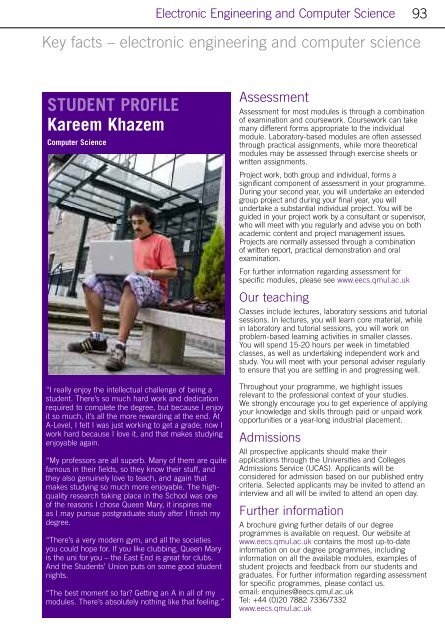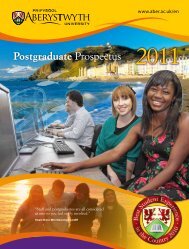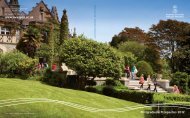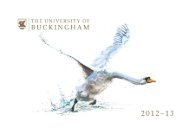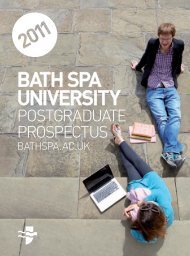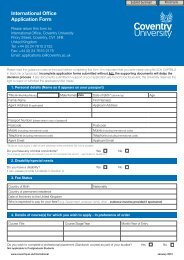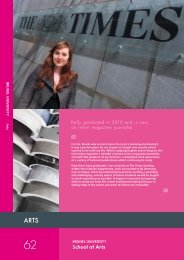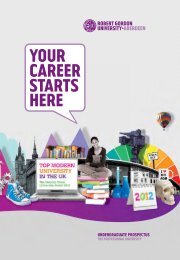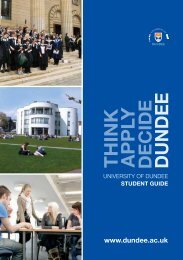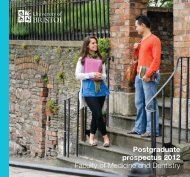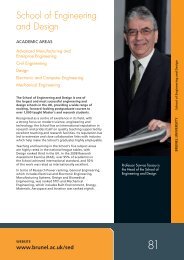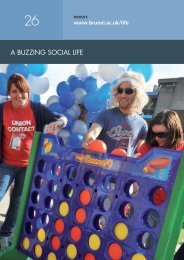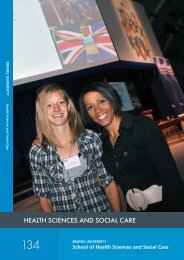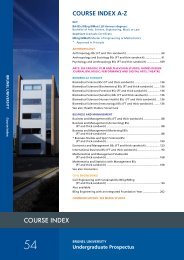student profile
student profile
student profile
Create successful ePaper yourself
Turn your PDF publications into a flip-book with our unique Google optimized e-Paper software.
Electronic Engineering and Computer Science 93<br />
Key facts – electronic engineering and computer science<br />
STUDENT PROFILE<br />
Kareem Khazem<br />
Computer Science<br />
“I really enjoy the intellectual challenge of being a<br />
<strong>student</strong>. There’s so much hard work and dedication<br />
required to complete the degree, but because I enjoy<br />
it so much, it’s all the more rewarding at the end. At<br />
A-Level, I felt I was just working to get a grade; now I<br />
work hard because I love it, and that makes studying<br />
enjoyable again.<br />
“My professors are all superb. Many of them are quite<br />
famous in their fields, so they know their stuff, and<br />
they also genuinely love to teach, and again that<br />
makes studying so much more enjoyable. The highquality<br />
research taking place in the School was one<br />
of the reasons I chose Queen Mary, it inspires me<br />
as I may pursue postgraduate study after I finish my<br />
degree.<br />
“There’s a very modern gym, and all the societies<br />
you could hope for. If you like clubbing, Queen Mary<br />
is the uni for you – the East End is great for clubs.<br />
And the Students’ Union puts on some good <strong>student</strong><br />
nights.<br />
“The best moment so far Getting an A in all of my<br />
modules. There’s absolutely nothing like that feeling.”<br />
Assessment<br />
Assessment for most modules is through a combination<br />
of examination and coursework. Coursework can take<br />
many different forms appropriate to the individual<br />
module. Laboratory-based modules are often assessed<br />
through practical assignments, while more theoretical<br />
modules may be assessed through exercise sheets or<br />
written assignments.<br />
Project work, both group and individual, forms a<br />
significant component of assessment in your programme.<br />
During your second year, you will undertake an extended<br />
group project and during your final year, you will<br />
undertake a substantial individual project. You will be<br />
guided in your project work by a consultant or supervisor,<br />
who will meet with you regularly and advise you on both<br />
academic content and project management issues.<br />
Projects are normally assessed through a combination<br />
of written report, practical demonstration and oral<br />
examination.<br />
For further information regarding assessment for<br />
specific modules, please see www.eecs.qmul.ac.uk<br />
Our teaching<br />
Classes include lectures, laboratory sessions and tutorial<br />
sessions. In lectures, you will learn core material, while<br />
in laboratory and tutorial sessions, you will work on<br />
problem-based learning activities in smaller classes.<br />
You will spend 15-20 hours per week in timetabled<br />
classes, as well as undertaking independent work and<br />
study. You will meet with your personal adviser regularly<br />
to ensure that you are settling in and progressing well.<br />
Throughout your programme, we highlight issues<br />
relevant to the professional context of your studies.<br />
We strongly encourage you to get experience of applying<br />
your knowledge and skills through paid or unpaid work<br />
opportunities or a year-long industrial placement.<br />
Admissions<br />
All prospective applicants should make their<br />
applications through the Universities and Colleges<br />
Admissions Service (UCAS). Applicants will be<br />
considered for admission based on our published entry<br />
criteria. Selected applicants may be invited to attend an<br />
interview and all will be invited to attend an open day.<br />
Further information<br />
A brochure giving further details of our degree<br />
programmes is available on request. Our website at<br />
www.eecs.qmul.ac.uk contains the most up-to-date<br />
information on our degree programmes, including<br />
information on all the available modules, examples of<br />
<strong>student</strong> projects and feedback from our <strong>student</strong>s and<br />
graduates. For further information regarding assessment<br />
for specific programmes, please contact us.<br />
email: enquiries@eecs.qmul.ac.uk<br />
Tel: +44 (0)20 7882 7336/7332<br />
www.eecs.qmul.ac.uk


